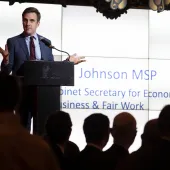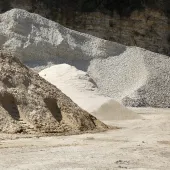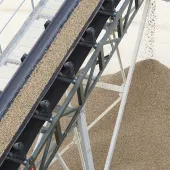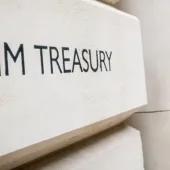QPANI seeks action on aggregates levy

Gordon Best meets Exchequer Secretary to call for action on damaging aspects of the aggregates levy
THE Quarry Products Association of Northern Ireland (QPANI) met last week with Exchequer Secretary Damian Hinds MP, to raise concerns over the continuing negative impact that the aggregates levy is having on Northern Ireland quarry and construction material suppliers, particularly those operating near the border with the Irish Republic who are competing against imported products not subject to the levy.
QPANI regional director Gordon Best (second from left), who attended the meeting along with Northern Ireland MPs Margaret Ritchie and Sammy Wilson (left), said: ‘We greatly appreciated the opportunity to meet the Minister to brief him about the continuing challenges being faced by the quarry and construction materials sector in Northern Ireland as a result of the high level of aggregates levy in Northern Ireland.
‘We also took the opportunity to express, in the strongest terms, our frustration that the current British Aggregates Association (BAA) legal challenge against the levy shows no sign of ending. It is now abundantly clear that the greatest impediment to progress on addressing specific negative outcomes of the aggregates levy in Northern Ireland is the continuing legal case being progressed by the BAA.
‘Despite the 13 years of challenge and a number of European Commission decisions, the validity and principle of the aggregates levy in the UK has never been questioned. The reality is that the exemption issues that are the current focus of the legal challenge could have been dealt with years ago through negotiation between industry and the Treasury.
‘The perverse fact that many commentators and many in the industry have missed is that the actions of the BAA over the last 13 years have actually increased the amount of levy the Treasury takes from UK quarry companies.
‘I would ask members of the BAA to consider – if the new legal appeal against the most recent Commission decision is successful, you will extend the levy even further without getting rid of it, as well as prolonging the agony and burden being carried by many small companies in Northern Ireland who operate close to the border with the Irish Republic, and those in other regions of the UK affected by the high level of the levy.’
Mr Best continued: ‘We pressed the Minister on the issue of unfair competition of imported concrete and asphalt products whose aggregate content does not attract the aggregates levy. We are pleased that he has instructed officials to consult with lawyers again to investigate, in more detail, what can be done to protect manufacturers of concrete and asphalt products from levy-free imported products.
‘We have agreed to continue working together to leave no stone unturned to find solutions to the specific problems being faced in Northern Ireland, within the constraints of the continuing legal challenge. This is proving increasingly difficult as the evidence required to gain state aid approval for another 80% derogation on the level of aggregates levy in Northern Ireland is, at present, beyond our grasp. In addition, new EU state aid guidelines will mean any new environmental scheme conditional on achieving a new reduction in the levy would subject the industry in Northern Ireland to significant additional costs.
‘Realistically, there will be no long-term review and opportunity to restructure the levy until the current legal case has ended. It is unfortunate and extremely disappointing that the legal merry-go-round has started again with a new BAA appeal against the latest European Commission decision.’









